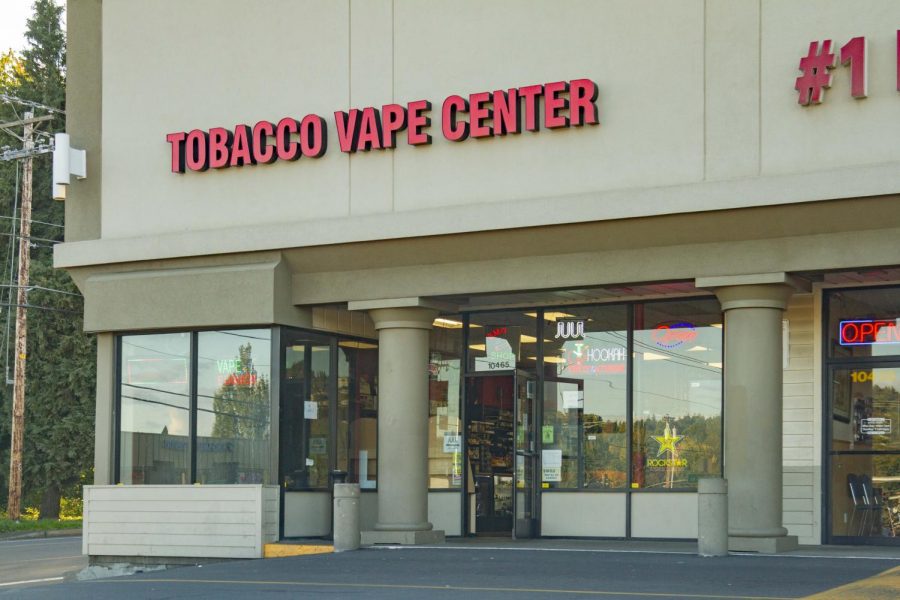Vaping Related Illnesses Are Sweeping the Nation: Here’s What You Need To Know
A tobacco and vaping supply store close to La Salle’s campus.
October 9, 2019
In recent months, a total of twenty four people have died from a mysterious lung illness, now being linked to nicotine vaping devices and black market THC cartridges. As a response, the Trump Administration is considering a ban on the sale of all flavored e-cigarettes. There is confusion about what exactly causes the illness — and in some cases an eventual death — but one thing is clear: a previously undiscovered symptom of vaping has now taken multiple lives.
What has likely caused this epidemic?
While twenty four people have had fatal encounters with vaping, over 1,080 confirmed and probable cases of hospitalization have been reported. However, it’s unlikely all these incidents will lead to death, as prior fatalities have happened quickly, within around four days.
Nicotine and THC e-cigarette devices have both been linked to the outbreak, but no specific chemical has been isolated as a probable cause. Although vaping cartridges containing vitamin E were initially suspected, researchers at the Mayo Clinic now believe this is not what is causing the deaths and hospitalizations.
Although the exact reason is still unclear, it is known that these devices can cause acute respiratory distress syndrome, a life-threatening condition in which oxygen is unable to circulate through the bloodstream due to an influx of fluid in the lungs.
What can be done legislatively?
The Trump Administration is working with the FDA to ban flavored e-cigarettes across the whole United States, with a goal of vastly decreasing the use of e-cigarettes among adolescents and young adults. The median age of those hospitalized is 23, which leads the FDA to believe that this ban could effectively cut use among minors, and by proxy, future illness.
Several states like California, Rhode Island, New York, Michigan, and Oregon have also taken action to ban the sale of flavored e-cigarettes in the next several months. Massachusetts, taking more drastic action, has enacted a temporary ban of all vaping products, while the CDC also recommends that consumers “consider refraining from using e-cigarette[s]” until the cause of the illness is determined.
The subject of regulatory measures on THC cartridges is both legally and practically more complicated than that of flavored e-cigarettes. From a legal aspect it is nearly impossible to regulate cannabis products on a federal level. This is because, unlike tobacco and nicotine, legal marijuana only exists at a state level. All laws and regulations are dictated by the individual state itself, which makes action with the help of the FDA unlikely.
On a practical level, legislative action will be much more difficult to enact against black market THC cartridges, as these are already illegal. It is also important to note that legal cartridges coming out of a certified dispensary are perceived as more safe, although medical professionals are still very skeptical that this is the case.
How does this relate to La Salle?
Ms. Caitlin Hudson, a health teacher at La Salle, covers in her classes the problems associated with vaping, specifically the epidemic among teenagers. During a lesson regarding vaping, she referred to advertisements that target youth as a key component that contributed to the growth of this epidemic, along with a change in style among vaping products.
She compared Juul, a popular competitor in the e-cigarette industry, and its sleekness, to Apple products. “I think the problem is both their marketing and also just the shape and style of the product they created,” Ms. Hudson said. In essence, she said that this design appeals to younger consumers of the product and, in turn, has caused many youth hospitalizations.
Juul did get itself into legal trouble for targeted advertisement, along with promoting the unapproved claim that vaping is more healthy than smoking a traditional cigarette. In response, the company replaced its former CEO with one experienced in the tobacco industry.
Ms. Hudson concluded in saying that the key way to counter this invasive and potentially dangerous marketing is to educate minors to stay away from nicotine and other vaping products. She also added that La Salle’s policy of helping potentially addicted students who are asking for help is critical in addressing this epidemic.





